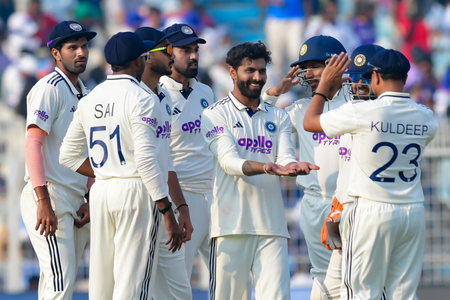
New Delhi, Nov 20 (IANS) There are many vital elements of intrigue with the ACA Stadium in Guwahati becoming India’s 28th Test venue when the second India-South Africa game begins on Saturday. With India having a 30-run humbling loss on a spin-friendly pitch inside three days at the Eden Gardens in Kolkata, how the surface would behave in Guwahati is the cynosure of everyone’s eyes.
The stadium had been one of the five venues for the 2025 Women’s ODI World Cup and aided the batters to make runs, as well as offer a lot of turn to spinners. But when it comes to red-ball cricket, an early morning start means moisture in the air will be there for an extended period and could make batting more difficult, thus helping the seamers.
Former India opener Aakash Chopra has backed the hosts to adapt to the conditions quicker than South Africa, while admitting the unusually early start, danger of losing overs in the final session and the pitch’s nature having an element of unknown makes things far more interesting in deciding the game’s result.
“Yes, it is interesting actually because this is having a start time of 9 am. When we used to play in Assam in November-December, then we used to look for start at 8:30 because it gets dark very early in the evening. So, in the end, the overs would be lost. I feel that no matter how much we try, we will lose overs. So, that will be a challenge for both teams, as they would want to get all the overs done for the day.”
“It would also be on their mind because if the pitch is good to play on, where there is an equal contest for the bat and ball, like we saw in Delhi that it took 5 days to win a match and if you keep losing 10-15 overs every day, then by the end of the 4th day, you have lost more than half a day, which is 60% of the overs. So, I think that will be a challenge for both the teams in terms of how they go through their overs,” said Chopra, a JioStar expert, while replying to an IANS query, during a virtual media day on Thursday.
With Guwahati having both red and black soil pitches on offer, it adds to the mystery of the pitch’s behaviour. “Plus, it is a new pitch. No one has any idea how Test cricket will be played in Guwahati because it is a new Test venue. Of course, first-class cricket has already happened here. But how the Test will unfold will be a question in everyone’s mind because we often say that home conditions are beneficial when the conditions are familiar to you.”
“But if you are playing there for the first time, be it Shubman Gill or Sai Sudharsan or Rishabh Pant or Dhruv Jurel, and the pitch is not as good for them as it is for Temba Bavuma or Ryan Rickelton, then it feels like there is no home advantage. But perhaps it is not as good as it can be in other venues.”
“So, it is a challenge and a slightly uncharted territory for both teams. While it is correct that we are still playing in India and that advantage cannot be taken away from us, as we grew up playing on these kinds of surfaces. But Guwahati might be a different one, though the red and black soil for the pitches there must have come from somewhere in India,” he added.
In a rare adjustment, the lunch and tea breaks will swap positions, forcing players to rethink their dietary intake and normal routine. Despite all this, Chopra has backed India to bounce back and level the series 1-1.
“We would like to believe and back ourselves to know these conditions or adapt a lot faster even if we find them slightly different as compared to, say, somebody who is brought up in Johannesburg and has played all his cricket at the Wanderers ground.”
“For him to come here and adapt will be tough. So we would like to assume and believe that it is going to be a lot tougher. So, yes, it is a new challenge for both teams. But you need to back the Indian players to get the most out of it and adapt to it relatively quicker than the opposition,” he said.
With moisture in the air and on the pitch during the early morning session, it can make life difficult for anyone who loses the toss. It would mean the losing side at the toss will need to negotiate tricky conditions longer than usual before the surface settles, thus adding another layer of complexity to the contest.
Though Chopra said in jest that talking about the toss’s importance won’t have any change in India’s bad luck with the toss result, he also felt that if the losing side at the toss survives the opening session unscathed, then it might be a blessing in disguise.
“See, again, it could be a blessing in disguise if what you are saying is true and it can’t be a better thing. It’s because when you win the toss in India, no one gives you bowling. No matter how much data is available historically, but when you see there is no grass or no live grass on the pitch, and there is no or limited moisture, it is very difficult to actually win the toss and bowl first.”
“Because if the first session goes well, then the batting will be good later on and maybe the fourth innings is going to be the toughest part of the game. So, since we lose tosses more than we win far more, it might actually be a blessing in disguise.”
“You lose the toss, allow them to bat and if there is early swing available, you can knock out 4-5 of them in the first session itself, and that will give you a fairly, like an upper hand. So, I have stopped thinking about tosses, because the Indian team doesn’t win tosses.”
Catch all the action from the second Test of South Africa’s tour of India 2025, from November 22, 9 am IST onwards, live on JioHotstar and Star Sports Network.
–IANS
nr/ab






